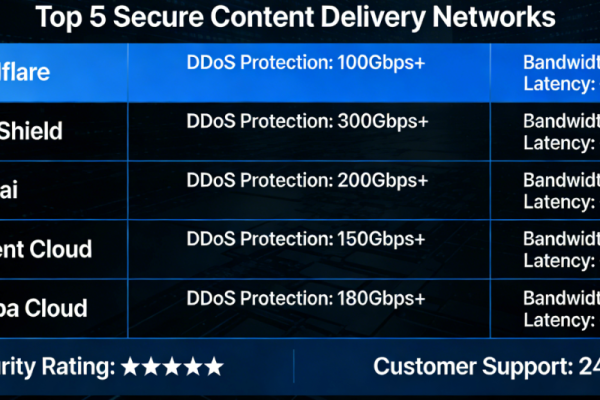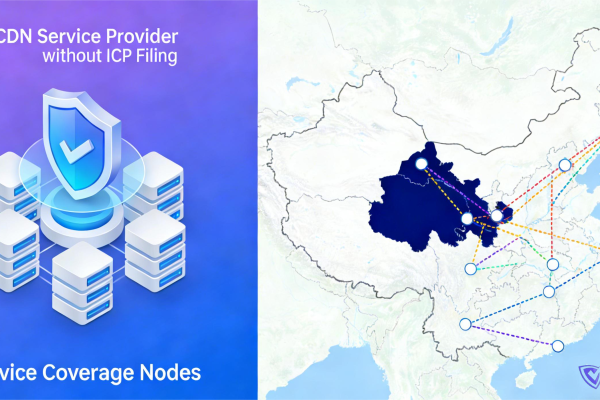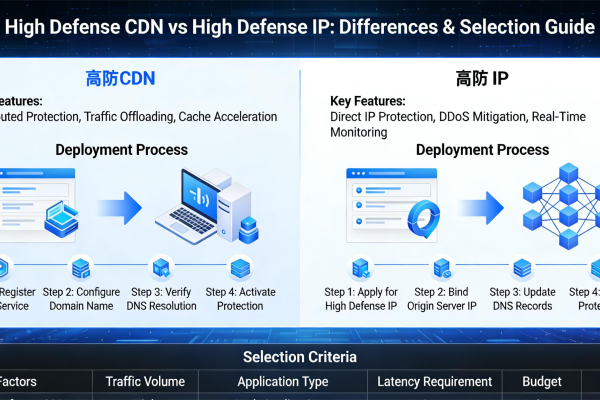High-Protection CDN Recommendations for E-commerce Websites: How to Prevent Your Site from Crashing Overnight
Why must e-commerce websites use high-protection CDN? Today we'll dive into attack risks, practical applications, technical differences, and recommended solutions to help you choose the right high-protection CDN service for your e-commerce platform. Whether you run a startup independent store, brand marketplace, or large-scale e-commerce platform, you'll find a one-stop solution here to enhance yo

In the internet era, an "e-commerce site" is like opening a virtual store, but your "storefront" can be blocked or disrupted at any time—this is what cyberattacks, especially DDoS attacks (Distributed Denial of Service attacks), do. E-commerce websites are inherently prime targets for attacks. Once traffic surges, servers can't handle it, not only affecting sales but also severely damaging brand credibility.
So, from the perspective of a cybersecurity engineer with over a decade of experience, this article will deeply explain: Why must e-commerce websites use high-protection CDN? How is it different from regular CDN? Which one suits you? I'll also recommend several high-protection CDN solutions tailored to e-commerce sites of different scales, hoping to help those who truly need it.

1. Why Are E-commerce Websites Prime Targets for Attacks?
Let’s start with some real-world issues.
Many people think website attacks only happen in "hacker movies," but e-commerce owners know better: during events like flash sales, 618, Black Friday, Double 11, or holiday promotions, someone will inevitably "target" you. The most common attack method is DDoS—suddenly flooding your site with millions of meaningless requests, crashing it, making it inaccessible to users, and causing losses ranging from thousands to millions.
Attackers have various motives:
- Malicious competition (competitors hiring attackers)
- Extortion (pay up or the attacks continue)
- Gray/black market activities like fake orders/resource hogging
- Hackers attacking for fun
And e-commerce sites are inherently "tempting": they have users, money, and data.
2. What Is High-Protection CDN? A Simple Explanation
You’ve probably heard of CDN—its basic function is to "make websites load faster and more reliably."
But high-protection CDN adds "security protection" capabilities, primarily defending against large-scale DDoS attacks, CC attacks, and more—essentially, it’s "the unkillable CDN."
Simply put:
Regular CDN is a highway; high-protection CDN is a highway entrance with a blast shield.
Its core technologies include:
- Large bandwidth redundancy pools (can handle traffic floods)
- Global IP pool rotation (switch IPs if blocked)
- Behavioral identification and access control (distinguish humans from bots)
- Dynamic/static resource separation (reduces origin server load)
- AI filtering systems (automatically detect malicious traffic)
3. What Could Happen If E-commerce Sites Don’t Use High-Protection CDN?
Here are some real-world scenarios:
- 1. Crashing during peak traffic: Users can’t access the site. E-commerce is highly time-sensitive—even one minute of downtime can cost thousands or more.
- 2. Slow loading speeds: A 5-second delay can cause a 50% drop in conversions, as proven by countless e-commerce tests.
- 3. Data anomalies or lost orders: Attacks can disrupt payments, inventory, and trigger customer complaints.
- 4. Competitors hijacking your traffic: You spend big on ads, but your site crashes, and competitors reap the benefits—this has happened before.
4. Key Benefits of High-Protection CDN for E-commerce
✅ 1. Withstand DDoS attacks: No matter how large the traffic surge, the CDN’s "cloud shield" protects your origin server.
✅ 2. Faster access speeds: CDN nodes are distributed globally, so users load content from the nearest node.
✅ 3. Improved stability: Even if some regions are blocked, CDN automatically reroutes traffic to avoid downtime.
✅ 4. Reduced backend load: Dynamic/static separation, caching, and pressure resistance prevent server crashes.
✅ 5. Better SEO and user experience: Fast, stable sites rank higher and retain users.
5. How to Choose High-Protection CDN? Don’t Just Look at Price
A common mistake e-commerce beginners make: focusing only on price while ignoring bandwidth, protection capacity, node distribution, support, and flexibility.
Key metrics to prioritize:
| Metric | Explanation | Recommended Standard |
|---|---|---|
| Protection Bandwidth | DDoS defense capacity (Gbps) | 10–100Gbps or higher |
| Node Distribution | Ensures users connect nearby | Major domestic regions + global hubs |
| Smart Routing | Auto-traffic distribution & attack detection | Supports AI routing & custom rules |
| Protocol Support | HTTP/HTTPS/WAF/CDN acceleration | At least HTTPS acceleration |
| Support Response | Ticket/WeChat/Telegram support | 24/7 response preferred |

6. Recommended High-Protection CDN Solutions for Different E-commerce Scales
🧩 Small E-commerce (Independent Stores, Startups)
Recommended Plan:
- Basic high-protection CDN package
- 10–20Gbps protection
- Hong Kong/Singapore/BGP multi-line
Ideal For:
- Shopify, WordPress, Shopline users
- Those avoiding ICP licensing or targeting overseas markets
Recommended Providers:
🧱 Medium E-commerce (Brand Stores, B2C Platforms)
Recommended Plan:
- Enterprise-grade high-protection CDN
- 50–100Gbps+ DDoS protection
- WAF firewall + customizable CC rules
Ideal For:
- Domestic platforms (ICP licensed)
- Brand stores, promotion pages
Recommended Providers:
- Tencent Cloud High-Protection CDN (ICP required)
- Alibaba Cloud DCDN+WAF (ICP required)
- Overseas: CDN07 Custom Plans
🏢 Large E-commerce (Multi-brand, Hybrid B2B/B2C)
Recommended Plan:
- Custom high-protection CDN gateway clusters
- Multi-line failover, BGP Anycast
- Direct connect + logs + IP rotation + API integration
Ideal For:
- Multi-site management
- Self-built CDN distribution
Recommended Providers:
- Tencent Cloud Enterprise Custom
- Baidu Cloud High-Protection Acceleration
- CDN07 VIP Custom (Telegram support)
7. Common E-commerce Attacks & Protection Tips
| Attack Type | Description | High-Protection CDN Defense |
|---|---|---|
| DDoS | Floods servers with traffic | Traffic scrubbing + distributed access + IP rotation |
| CC Attack | Fake high-frequency visits | Behavior analysis + rate limiting |
| HTTP Flood | Crashes origin servers via requests | Parameter filtering + URI protection |
| DNS Attack | Disrupts domain resolution | High-availability DNS clusters |
| SSL Handshake Attack | Exhausts resources via HTTPS | TLS rate limits + blacklisting |
8. High-Protection CDN Deployment Tips
🔧 1. Pre-switch DNS settings
Set DNS TTL in advance to avoid delays during CDN migration.
🔐 2. Combine with WAF
Web Application Firewalls (WAF) block more application-layer attacks (e.g., SQLi, XSS).
🧠 3. Optimize caching & CC rules
Avoid blanket caching—customize rules for dynamic pages/APIs.
🕵️ 4. Monitor logs & user behavior
Detect attack patterns early—don’t let CDN become a "black hole."
Final Advice: Prepare for the Worst
DDoS attacks strike without warning. Like a midnight hurricane, by the time your site crashes, losses may already be severe. Deploying high-protection CDN is like equipping your site with bodyguards and blast shields—even the fiercest attacks won’t be fatal.
In e-commerce, it’s not about avoiding attacks—it’s about surviving them.
Share this post:
Related Posts

Hong Kong High-Defense CDN Recommendations (2026 Latest Edition)
Not all Hong Kong high-defense CDNs can withstand attacks. This article compares the protection stre...

No-ICP CDN Recommendations | Which Ones Actually Speed Up Mainland China AND Can Withstand Attacks?
How to choose a no-ICP CDN? Based on real webmaster tests, this article compares multiple CDN provid...

What's the Difference Between DDoS-Protected CDN and DDoS-Protected IP? A Clear Guide to Help You Choose.
What's the difference between a DDoS-protected CDN and a DDoS-protected IP? Which one should your we...
